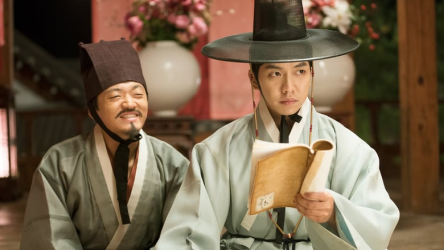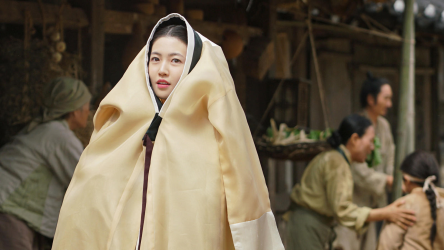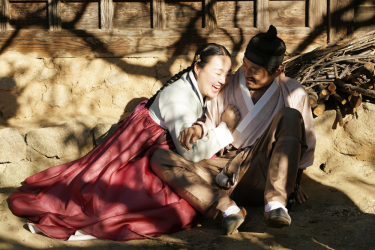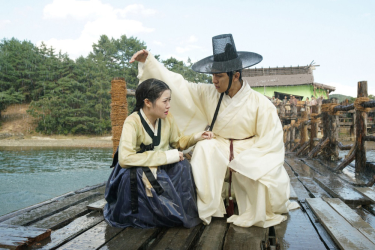The second film in our Korean double-feature (after Little Forest) was another great example of why we’re favoring the orient these days: The Princess and the Matchmaker is a historical comedy/drama/action flick about an honest astrologer and an unfortunate princess who needs to be married to save the kingdom from famine.
Just soak that up for a second.

Your soaking abilities are being judged.
Our story begins with a comedic vignette involving a fraudulent astrologer scamming people with fake charts about who they should marry, and being outed and arrested by Seo Do-Yoon, a good astrologer. (I think that’s right. To be honest I had a hard time up front with who was who. And I don’t know why an astrologer would be arresting anyone, even astrologer-frauds.) It’s then we learn about Princess Songhwa.
Princess Songhwa has a reputation as being unmarriable, she’s such bad luck. And again, there’s a series of comedic vignettes showing this misfortune and why, therefore, no one wishes to marry here. (She is, of course, quite pretty but the actress does a tremendous job here transforming from a goofy comic dolt to a tremendously serious and beautiful woman.)

Look at that expression.
But the land is starving, and the king’s astrologer tells him that she must marry if he’s to save the land. He decides to do this and to have a kind-of astrologer “star search” (heh) to find the best astrologers in the land. This of course ends up with Do-Yoon being one of the astrologers picked to match charts with the Princess.
We then get a series of stories where Do-Yoon, at Songhwa’s pleading, takes her around to meet her prospective husbands. There are a lot of rules about where women, much less princesses are allowed to go in 17th century Korea, so there are some good comic bits as Songhwa dresses up (very unconvincingly) as a male. It’s interesting to note that while some of these scenes are quite broad, comedically, the movie ultimately ends up giving each character a degree of respect. Even our fake-astrologer at the front—we run into him again as he’s making the rounds pretending to be a tantric sex expert—turns out to be, in his own way, a noble character.

I’M NOT A PRINCESS! DON’T NOTICE ME!
Then we get an action scene, as someone attempts to murder our heroes, and the flashbacks start getting a little darker. It turns out that Songhwa’s “bad luck” began when she was brought to the palace, only to have an unscrupulous astrologer tell the king that the only mother Songhwa has ever known had to be sent away, because the two together were insurmountable misfortune. The Chicago Tribune from which I stole the above picture calls this tonal confusion, but we absolutely loved it. Asian movies simply don’t have the kind of constraints American ones do. We see them pull of this kind of shift like it was nothing!
Time and time again, the evil court astrologers (acting on behalf of a queen who is sure that Songhwa spells trouble for her princeling) crush the poor girl and cause her misery and misfortune at every turn. And the whole matchmaking setup is just a way to get her into the hands of someone who can kill her and control her fortune.
Things get very dark, indeed, by the end of the movie. But by that time all of our characters have gone from kind of flat stereotypes to fully-fledged people, and we get to see them all perform heroics at some point or another.

Liberally interspersed with “fat girl chases love” jokes.
Besides the tonal shifts, the beautiful cinematography, the well-done, traditional score, and a plot that keeps you guessing up to the end, what struck me was the tremendous respect paid to tradition. For all their modernity, the Koreans (and the Japanese and Chinese) are very respectful of history. There were good astrologers and bad ones, and the good ones were honest and hard-working. There were rules, and sometimes you had to break them, but you paid the price.
I dunno, I can scarcely imagine a modern American film like that. The Witch, maybe, with a lot of caveats.
Anyway, we loved it, and it was radically different from Little Forest and we walked away with a feeling like we’d just seen an epic with a run time of 1:50 (including credits!).

The ending will surprise you, too.

One thought on “The Princess and the Matchmaker”